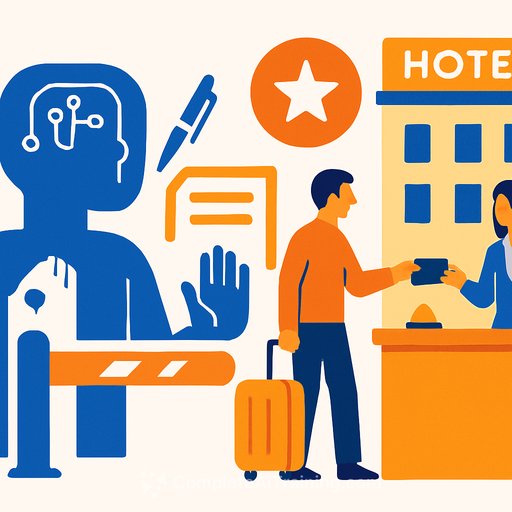Hotels Must Rethink Loyalty as AI Agents Start Booking for Guests
AI agents are moving from helper to decision-maker in travel. A new paper from Florida Atlantic University argues that loyalty will increasingly be won or lost with algorithms that do the searching, comparing, and booking for guests.
"AI agents will be the new gatekeepers of loyalty," said Anil Bilgihan, Ph.D., professor of hospitality management in FAU's College of Business. "The question is no longer just 'How do we win a customer's heart?' but 'How do we win the trust of the algorithms that are advising them?'"
What changes for hotels
Instead of guests browsing brands, AI agents will scan options against budgets, amenities, reviews, and historical preferences-then present a short list or book automatically. If your property doesn't make that list, you're invisible.
As Bilgihan noted, an AI isn't swayed by traditional ads. It sorts by machine-readable criteria. That pushes hotels to be both guest-loved and algorithm-ready.
Key findings from the FAU research
- Decision-making shifts to AI agents, not consumers, for discovery and bookings.
- Loyalty tilts toward the agent or its ecosystem, unless hotels build dual appeal: human and algorithmic.
- Winning visibility requires clean data, clear value, and service reliability that models can verify.
What this means for hotel and event leaders
The next loyalty advantage is operational excellence expressed as data. Emotional branding still matters-once the guest arrives. But first, you must be ranked, recognized, and recommended by the agent.
Action plan: Be present in the recommendation set
- Make your data machine-readable: Use consistent naming, amenity lists, room types, and fees across your site, OTAs, GDS, and metasearch. Implement schema.org markup (Hotel, Room, Offer). Keep rates and availability accurate in real time.
- Clarify value in hard numbers: Agents score certainty. Guarantee perks (late checkout, breakfast, upgrades) with clear rules and blackout dates. Publish them where models can ingest them.
- Simplify offers: Build rule-based rate plans and fee transparency. Remove edge cases that confuse pricing logic.
- Supercharge reviews: Encourage fresh, verified reviews. Respond with concise, factual summaries that reinforce amenities and service wins.
- Create agent-ready content: Short, structured facts beat flowery copy. List must-have amenities, constraints (parking, resort fees), and standout features in bullet points.
- Use first-party data the right way: Invite guests to share preferences pre-stay. Apply them on property. Earned trust increases the chance the agent will favor you next time.
- Test your visibility: Run routine prompts through top agents (budget, city, amenities). Track how often your property appears and what blocks inclusion.
- Integrate where bookings happen: Strengthen connections to major ecosystems and metasearch. Fast, reliable feeds win.
- Train your team: Ensure revenue, marketing, and ops teams understand how AI agents source, score, and select hotels. Upskill on data, prompts, and measurement.
Build loyalty programs for humans and algorithms
- Predictable perks: Agents prefer guaranteed benefits over vague "subject to availability." Make terms explicit.
- Status with substance: Offer benefits that impact decision logic: fee waivers, breakfast, late checkout, mobile-first check-in, and confirmed room type.
- On-stay personalization: Use guest preferences in-room and in-venue (F&B, events, wellness). Report back via post-stay summaries the agent can parse.
- Machine-visible recognition: Reflect benefits in confirmations and receipts so agents can "see" delivered value.
Why this matters right now
"Let's just take Florida, for example. We welcomed over 34 million visitors this summer alone, and that surge, in combination with technological advances, is rewriting the rules of hospitality," said Melanie Lorenz, Ph.D., associate professor of marketing. "To keep up this trend and stay visible in the future, loyalty must be emotionally resonant, algorithmically relevant, and strategically designed for both human travelers and autonomous agents."
Ethics, privacy, and fairness
- Bias: Some agents may overweight certain sources. Monitor outcomes and diversify data inputs where possible.
- Privacy: Get clear consent for preference data. Minimize collection and secure storage. Be explicit about use.
- Explainability: When guests ask "Why this hotel?", give a simple, factual rationale that aligns with their preferences.
The constant: Guest experience
"No algorithm can cover up for a disappointing stay," Bilgihan said. AI may guide discovery and booking, but the core of loyalty is still a great stay, every time.
Hotels that combine strong operations with digital fluency will be best positioned to thrive.
About the research
The conceptual paper, "Artificial Intelligence (AI) Agents and the Future of Customer Loyalty," appears in the International Journal of Contemporary Hospitality Management. Authors include Anil Bilgihan, Ph.D.; Max Ostinelli, Ph.D.; Ye Zhang, Ph.D.; and Melanie Lorenz, Ph.D., at Florida Atlantic University.
About Florida Atlantic University
Florida Atlantic University, founded in 1961 and opened in 1964, serves more than 30,000 students across southeast Florida. FAU spans 10 colleges and is recognized by the Carnegie Foundation as a High Research Activity institution. Focus areas include healthy aging, biotech, coastal and marine issues, neuroscience, regenerative medicine, informatics, lifespan, and the environment.
Further reading and resources
- International Journal of Contemporary Hospitality Management
- Florida Atlantic University
- AI training paths by job role (for hotel teams)
Your membership also unlocks:






